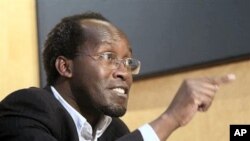Human rights groups and the Rwandan government have hailed France's arrest of a suspected rebel leader whose group is blamed for atrocities in the Democratic Republic of Congo.
Paris police detained Callixte Mbarushimana, following an arrest warrant issued by the International Criminal Court in the Hague.
Court prosecutors say Mbarushimana is a leader of the Rwandan Hutu FDLR (Democratic Forces for the Liberation of Rwanda) rebel group, which is accused of looting, raping and killing civilians in eastern Democratic Republic of Congo. The group was most recently blamed for mass rapes in late July and early August of more than 300 civilians in isolated villages in that region.
The ICC, which has charged Mbarushimana with war crimes and crimes against humanity, has hailed his arrest. So have the Congolese and Rwandan governments. and human rights activists like Geraldine Mattioli-Zeltner, international justice advocate at Human Rights Watch.
"We believe this arrest sends a very strong signal to abusive commanders in the Congo and else where that they will not be able to escape justice, no matter where they hide," said Mattioli-Zeltner.
An ethnic Hutu, Mbarushimana reportedly fled Rwanda following the 1994 genocide of ethnic Tutsis. He has been living in France where he received refugee status in 2003.
Human rights groups claim a number of suspects of the Rwandan genocide and other African atrocities live in France and other parts of Europe and the United States. Only some have faced justice.
"There is quite a big number of genocide suspects still at large in developed countries. And the practice of putting them to trial has developed over the past few years," said Mattioli-Zeltner.
Belgium, for example, has held three trials related to the Rwandan genocide under its principle of universal jurisdiction, which allows for prosecutions of crimes against humanity committed elsewhere. In June, a Finnish court sentenced a Rwandan preacher to life in prison for his role in the genocide.
But Mattioni-Zelter notes other suspects have not been brought to trial.
"In France, there are about five, six well-known suspects of the genocide in 1994 who have lived unbothered since the genocide," added Mattioni-Zelter. "And that was the case of Callixte Mbarushimana."
That may change. The French government recently established a special judicial unit to prosecute people accused of war crimes, genocide and crimes against humanity committed in France and overseas.
Besides Mbarushimana, the International Criminal Court has issued arrest warrants against four other suspected rebel leaders in eastern Congo. Three are currently on trial.




